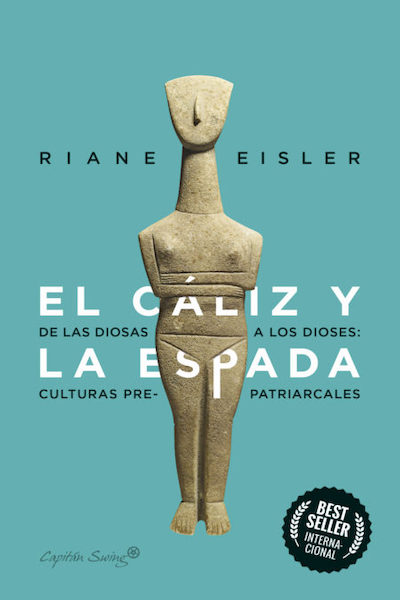May 24, 2021
 The Chalice and The Blade, or El Cáliz y la Espada, has been reissued in Spain, thirty years after its first Spanish print edition. Dr.Eisler's book may be thirty years old, but it continues to show that it was ahead of its time. The answers and analysis that Dr.Eisler wrote thirty years ago, are as relevant today as they were when The Chalice and The Blade was first printed.
The Chalice and The Blade, or El Cáliz y la Espada, has been reissued in Spain, thirty years after its first Spanish print edition. Dr.Eisler's book may be thirty years old, but it continues to show that it was ahead of its time. The answers and analysis that Dr.Eisler wrote thirty years ago, are as relevant today as they were when The Chalice and The Blade was first printed.
In an interview with El Confidencial, an independent online newspaper based in Spain, Dr. Riane Eisler talks with Marta Medina about the changes that have occurred in the world since 'The Chalice and The Blade's' first edition. Their discussion was published in an El Confidencial article titled, "Riane Eisler huyó del Holocausto para revolucionar la historia: "Cambiemos el relato masculino" or Riane Eisler fled the Holocaust to revolutionize history: "Let's change the masculine story".
The article, written in Spanish, focuses on how the world has changed since Dr. Eisler first wrote 'El Cáliz y la Espada'. The following are notable quotes from the piece:
More than three decades after its publication, when feminist theories have left the margins and have conquered a space in the public debate, when movements such as the #MeToo or Black Lives Matter have pointed out the systemic imbalances in our society, Capitán Swing reissues 'El Cáliz y la Espada' and its author reflects on the changes that have occurred in the world since that first edition.
Más de tres décadas después de su publicación, cuando las teorías feministas han salido de los márgenes y han conquistado un espacio en el debate público, cuando los movimientos como el MeToo o Black Lives Matter han señalado los desequilibrios sistémicos de nuestra sociedad, Capitán Swing reedita 'El cáliz y la espada' en español y su autora reflexiona sobre los cambios que se han producido en el mundo desde aquella primera edición en una entrevista con El Confidencial.
Read the entire article in Spanish here.
Marta Medina: When The Chalice and the Blade was published in 1987 the Berlin Wall had not yet fallen. Neither had the USSR. The main fear of the population was a nuclear apocalypse that would lead to the extinction of the human being. More than thirty years later, when those fears no longer exist, when feminism has entered the public debate, at what point do we find ourselves in the domination-collaboration tension of our cultural model?
Dr. Riane Eisler: As you say, we have achieved things since, to put it into context, since the 70s we have defied laws that were terribly discriminatory. I wrote a letter to the Supreme Court of the United States about an idea that was then radical: that women should be considered as persons in the Equal Protection Clause of the Fourteenth Amendment [which says “no State of the United States may deny any person within its jurisdiction equal protection of rights ”]. There is no doubt that we have made progress, but at the same time there is resistance to change. I wrote The Equal Rights Handbook (could be translated as 'Equal Rights Handbook'), which is still and unfortunately very relevant because that amendment fails in its mission.
We are now in a moment in which we move at the same time towards collaboration and, at the same time, a resistance and a regression that lead to domination. I mean, 70 million people voted for Donald Trump. A man who, in addition to being an authoritarian, violent and abusive profile, despises women. Someone who says that "grab them by the pussy". And he bragged about it! And 70 million people supported him at the polls. What does that tell us?
Marta Medina: Cuando 'El cáliz y la espada' se publicó en 1987 en Muro de Berlín todavía no había caído. Tampoco la URSS. El principal temor de la población era un Apocalipsis nuclear que llevase a la extinción del ser humano. Más de treinta años después, cuando ya no existen aquellos miedos, cuando el feminismo ha entrado en el debate público, ¿en qué punto nos encontramos en la tensión dominación-colaboración de nuestro modelo cultural?
Dr. Riane Eisler: Como bien dices, hemos conseguido cosas desde, por poner mi contexto, los años 70 y hemos desafiado leyes que eran terriblemente discriminatorias. Escribí una carta a la Corte Suprema de los Estados Unidos sobre una idea que entonces era radical: que las mujeres debían ser consideradas como personas en la Cláusula de Igualdad de Protección (Equal Protection Clause) de la Decimocuarta Enmienda [que reza “ningún Estado de los Estados Unidos podrá negar a persona alguna dentro de su jurisdicción la protección igualitaria de derechos”]. No hay duda de que hemos hecho progresos, pero al mismo tiempo existe una resistencia al cambio. Escribí ‘The Equal Rights Handbook’ (podría traducirse como ‘Manual de la igualdad de derechos’), que todavía sigue siendo todavía y lamentablemente muy relevante porque esa enmienda fracasa en su cometido, y yo misma predije que si esa enmienda fracasaba experimentaríamos una regresión política.
Estamos ahora en un momento en el que nos movemos al mismo tiempo hacia la colaboración y, a la vez, una resistencia y una regresión que llevan a la dominación. Quiero decir, 70 millones de personas votaron a Donald Trump. Un hombre que, además de ser un perfil autoritario, violento y abusador, desprecia a las mujeres. Alguien que dice aquello de “agarrarlas por el coño”. ¡Y presumía de ello! Y 70 millones de personas lo apoyaron en las urnas. ¿Qué nos dice eso?
Recently, Dr. Eisler's work is gaining a lot of popularity and interest in Spanish speaking countries. The Chalice and the Blade was recently reissued in Spain and will soon be reissued in Colombia as El Cáliz y la Espada. Dr.Eisler is very excited and touched by the outpour of interest and passion for her work by Spanish readers and is looking forward to connecting with them more in the future.
See also: El Cáliz y la Espada: The popularity of the Chalice and the Blade in Colombia



Leave a Reply